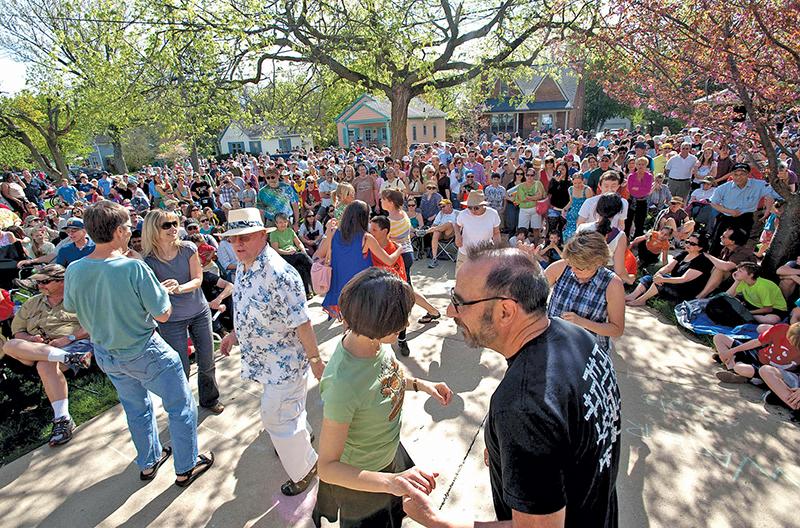Eight years ago, the free, front-porch concerts gave the neighborhood a cool vibe–and a new name. But in March, founders Claire and Paul Tinkerhess announced that they’re ending the Water Hill Music Fest.
“The decision stems from personal priorities, concern for public safety, and the challenge of maintaining its neighbor-to-neighbor, noncommercial character,” they wrote in a post on the festival website.
Though the Tinkerhesses declined to say more, their friends and neighbors were eager to share what they knew–and how much they loved the festival.
“We talked about continuing it,” says Jud Branam, guitarist with Americana/alt-country band Corndaddy and the Tinkerhesses’ Miner St. neighbor. “A group of us would work with Claire and Paul during the transition. But after a meeting or two, they were like, ‘We want to let it go. But if you want to start something next year …'”
Branam can dig it. “Creating a map and a schedule was a lot of work. And their family is calling them. They have a grandbaby on the way.” And while Paul is “a visionary,” Branam says, “he moves on. It was a single vision: noncommercial with no publicity and lots of quaint and interesting features.”
“Paul and Claire: bless their hearts,” exclaims Connie Huber, one of the three singing Chenille Sisters. “It was so much work. They set up the website.”
“I couldn’t thank them enough,” says Vincent York, sax player and founder of Jazzistry, a nonprofit history-through-music education program. “They’ve been the people to bring folks together. And they were volunteers.”
“The crowds have been growing each year,” adds York. “I heard people say it was a joy to come here. People would come from out of state.” Branam says he heard by the end “estimates of more than 10,000 people.”
They came for the homemade music played on porches and in driveways. “You had to have a resident in the home play in the band,” Branam says, explaining the festival’s participation requirements, “and it always ran right around ninety to a hundred performers. I played in all of them except one. We’d have four hundred people standing in front of our house.”
How did the neighbors feel about the mob of music lovers? “They were so sweet!” Huber says. “One neighbor gave out popcorn and lemonade. People opened their homes and their bathrooms.”
“We volunteered our restroom,” says Branam. “Part of the deal was not to have Porta-Potties.” He says the only real controversy was about the name of the event.
The Tinkerhesses named the festival after Fountain and Spring streets and the city water treatment plant on Sunset. By doing so, they also named their part of town. Water Hill is “a natural name and took on a life of its own,” Branam says.
“I thought it was called that because there was always water in my basement,” laughs Huber.
There was one insoluble problem. Thousands of slow-moving pedestrians made “the neighborhood pretty im-passable if you were trying to drive through,” recalls Branam.
“I was worried something could happen, but it didn’t,” says York. “It was mostly very positive feedback. There was never police involvement. It was all neighborhood and community oriented.”
And just because the Water Hill Music Fest has ended doesn’t mean Water Hill is falling silent. Big City Bakery owner Scott Newell has received a permit for a street festival on Spring at Miller.
“In general, showing up on the first Sunday in May will be entertaining,” Branam emails. “There are some bands planning to play, some continuing in the format of prior years and some new efforts. People are loosely self-organizing at Facebook.com/MFFWaterHill.”


